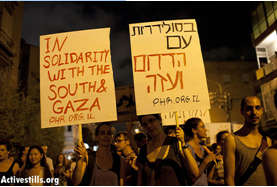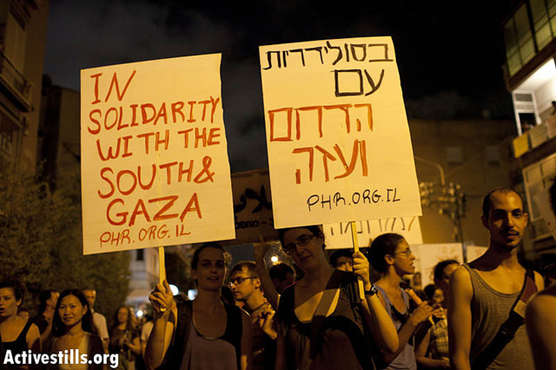
Emile Habibi often used the term, al-farj al-arabi, which freely translated means “the Arab life preserver.” When the leaders of Israel were forced into a corner, we would say: “God save us from the Arab life preserver,” lest an action against civilians or verbal vitriol turn things around and engage the world in deploring the “extremism” of the Arabs who want to throw the Jews into the sea, at a time when, in fact, the Palestinians were being thrown to the mercies of the 22 brother countries.

Rally in Tel-Aviv for social justice, last Saturday, August 20 (Photo: Activestills)
This is nothing new. Anyone who rummages in history will find that the expression “Trust the Mufti” is attributed to David Ben-Gurion, whose vitriolic statements only served the aspiration to expel more and more Arabs.
In Syria al-farj is the mendacious vitriol against Israel and the United States. Bashar Assad is using al-farj al-israili as an excuse for suppressing the mass demonstrations in Syria.
The latest “farj” was on Thursday, in the form of a criminal action against civilians. But this time among other things the farj helped squelch the social protest that is beginning to threaten Prime Minister Benjamin Netanyahu’s continued term in office. The terror attack was aimed at achieving three goals: Embarrass the Egyptian revolution by undermining its control of the border, to subvert the attempts by Palestinian Authority President Mahmoud Abbas to obtain recognition for a Palestinian state and last but not least – to set the ground on fire once again.
I object to conspiracy theories and I don’t believe them. But these three aims of the bloody attack suit Netanyahu’s policy: He objected to the change taking place in Egypt and tried to sell the world his own approach, to the effect that that in light of those changes Israel must hold strong.
He is making every effort to undermine the efforts for recognition of a Palestinian state at the United Nations and he is already planning how to react to a new intifada, the one whose supposed fomenters are saying will not happen.
So at the moment it’s back to normal. Because as distinct from dealing with a fresh and contagious public protest emitting rays of light that blind those accustomed to moving in dim mazes, everyone here knows very well how to behave when there is a terror attack.
Everything ticks along like a Swiss watch and the sense of victimhood hovers over all. It isn’t pleasant to feel like a victim but it is more convenient to feel that it’s a decree from heaven to continue to live by the sword. So it’s back to normal.
We are waking up from the rosy social dream as the TV screen becomes occupied by the tiresomely familiar faces: generals, politician and television commentators Roni Daniel and Ehud Yaari, with their Judgment Day faces.
The social protest can wait, because it’s not possible to give up the war momentum: bombings in Gaza, missiles on the south and this time the flames are reaching as far as Egypt.
With a foreign minister who has already threatened to bomb the Aswan Dam, it’s going to be a lot of fun here.
Seriously, though: It will be sad if the action, its offshoots and its escalations cut down the tender infant born yesterday. As in David Grossman’s poem, “Spring is so short here,” it is “intoxicated and perfumed – how beauty can heal!”
Will its life be cut short as swiftly as it grew and blossomed and caught on in the whole society? This is the test of the protest movement, this is the test of all the good folks in both nations.


